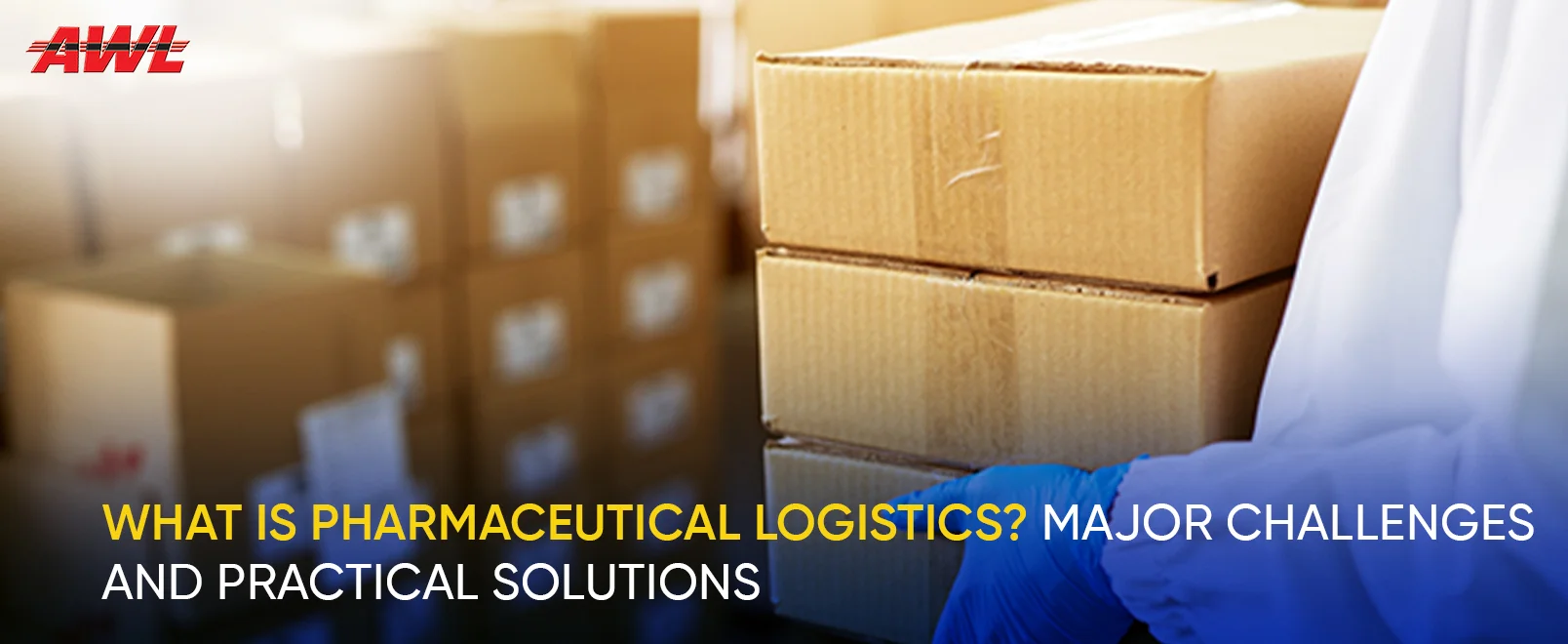
What Is Pharmaceutical Logistics? Major Challenges and Practical Solutions
08 May 2025

Medicines save lives. But before they reach hospitals or patients, they travel a long way. This journey needs care. It needs planning. It needs strong systems in place. That is where logistics comes in.
Pharmaceutical logistics is the process of moving, storing, and delivering medicines and medical products. Safety and efficacy of drugs is ensured from the factory to the end user, as this is critical in healthcare and requires special attention.
This blog provides a deep dive into the workings and problems of this service and what methods companies use to solve them.
Why Pharmaceutical Logistics Is Unique
Logistics in the pharma sector is not like moving regular goods. Medicines need a controlled environment. Some must stay cold. Others need protection from light. Time is always important. A delay can lead to waste. Worse, it can affect patient safety.
These products are sensitive. Their quality can drop if stored the wrong way. One small mistake can lead to big problems. So, every step of the journey matters.
Key Steps in the Logistics Chain
- Storage: Drugs are kept in warehouses. These must have a stable temperature and humidity. Many have special cooling systems.
- Handling: Workers must wear gloves and follow safety rules. Products should not be dropped or exposed to the open air for long.
- Transport: Vehicles must maintain set conditions. Data loggers track the temperature and other factors during the ride.
- Tracking: Real-time tracking helps prevent theft and ensures timely delivery.
- Delivery: The product is handed over with proper paperwork. At times, digital records are shared for safety and speed.
Challenges in Pharmaceutical Logistics
Even with the best plans, challenges still exist. Some are technical. Others are about manpower or local rules.
1. Temperature Control
Many drugs must stay between 2°C and 8°C. The task is not easy in summer or when roads are poor. In some regions, power cuts can spoil medicines. Cold chain pharmaceutical logistics requires backup plans at all times.
2. Strict Regulations
Governments have many rules for medicines. Each country has its own set of laws. Missing one document can stop a shipment. Furthermore, labels and storage must follow these rules. This slows down the process.
3. Global Supply Chains
Medicines often come from different countries. A delay in one place affects the whole chain. Customs issues or strikes can block the flow. During emergencies, the risk of delays in the supply chain increases significantly.
4. Lack of Trained Staff
Handling medical products needs skill. Not all workers receive proper training. Such ignorance can lead to mistakes in packing, storing, or delivering.
5. Counterfeit Products
Fake drugs are a global threat. Counterfeit products endanger lives and undermine trust. It’s challenging to track and stop them without strong systems.
6. Inventory Mistakes
Too much stock can lead to waste. Too little stock can cause shortages. Balancing inventory needs, planning and smart tools.
Practical Solutions to Overcome Challenges
Good companies invest in systems, tools, and people. They find smart ways to deal with these problems. Here are some of them:
1. Technology for Real-Time Monitoring
Sensors now track temperature, location, and shocks. These devices alert the team if anything goes wrong. GPS helps monitor the journey. This procedure ensures that the product is safe at every point.
2. Automation and AI Tools
Many companies now use software to plan routes, track stock, and manage orders. AI helps predict delays. It can even offer faster delivery options. Automation cuts human errors.
3. Better Packaging Materials
New types of packaging keep products stable for longer. Some boxes can stay cold without electricity. Others protect from light or damage. Good packaging adds a layer of safety.
4. Blockchain for Safety
Blockchain can record every step of the journey. This makes the system transparent. If a product is fake, the system can trace it back to the source. This helps build trust.
5. Training and SOPs
Companies must train their staff. Simple checklists and rules help workers remember key steps. Regular training keeps everyone alert and ready.
6. Partnerships with Strong Players
Working with reliable pharma logistics companies makes the job easier. These partners bring experience, tools, and reach. They help meet global standards and manage risk better.
Importance of Cold Chain in Pharma
Some vaccines, insulin, and cancer drugs must always stay cold. Cold chain pharmaceutical logistics is a part of the system that focuses only on this. It uses chillers, freezers, and special trucks. There is no room for error.
If the cold chain breaks, the product can become useless. So, systems must have alerts and backups. Regular checks are a must. This is not just about business. It is about saving lives.
India’s Role in Pharmaceutical Logistics
India is a global leader in drug production. With that comes a growing need for reliable logistics. AWL India is one of the companies helping bridge this gap. It offers end-to-end services for storage, transport, and delivery. It uses smart tools to improve speed and accuracy.
As demand for Indian drugs rises, so will the need for stronger supply chains. The government is also working on better roads, digital tools, and air cargo support.
The Road Ahead
Pharmaceutical logistics will keep growing. The COVID-19 pandemic showed how critical fast and safe delivery is. From vaccines to oxygen, logistics were at the heart of the fight.
In the future, we can expect:
- More use of drones in remote areas
- Smart warehouses with robots
- AI-based systems that predict stock needs
- Greener transport options to reduce pollution
But human care and planning will always matter. Machines can help, but people still lead.
Conclusion
Pharmaceutical logistics is not just about boxes and trucks. It is about health and trust. It is about reaching the last mile with care.
The challenges are many. But the solutions are here. With the right people, partners, and tools, we can build strong systems. Every step in the journey counts. And every step must be right.

David Williams
Team Leader